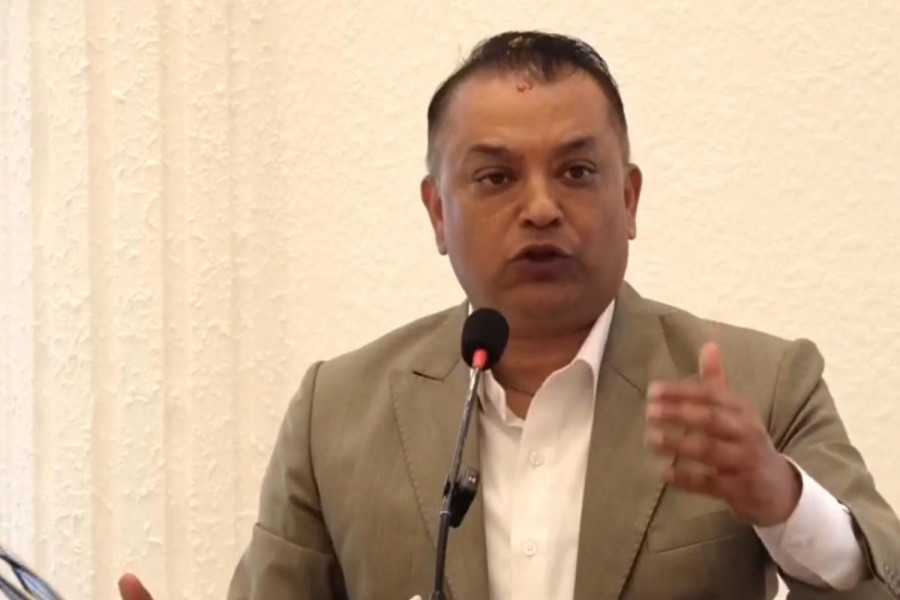Politics
Gagan Thapa blasts government over rising discontent
The Nepali Congress general secretary breaks silence as protests by teachers, civil servants and monarchists add pressure on ruling parties.
Post Report
Thousands of teachers have been protesting near the country’s main administrative complex, Singha Durbar, for the past two weeks. The position of the central bank governor remains vacant, with growing speculation that the government may appoint someone favoured by ‘middlemen’ rather than a qualified candidate.
Similarly, six key positions of additional inspectors general (AIG) in Nepal Police remain unfilled, leaving several vital departments without leadership. Meanwhile, the voices of pro-monarchy and pro-Hindu groups are growing louder, with demonstrators taking to the streets demanding the restoration of the Hindu state and monarchy.
As the government focuses on preparing the annual budget, governance, administration, and service delivery are under fire—both from the streets and within the ruling coalition. Notably, the much-touted constitutional amendment, which was a major commitment between the two main coalition partners before forming the government, has been sidelined. Nine months on, the issue is gradually fading due to growing unease between the two parties.
Amidst these mounting challenges, Gagan Thapa, a general secretary of the Nepali Congress and former staunch defender of the current coalition, dropped a political bombshell on Tuesday. Once an active member of the ruling party’s internal mechanism, Thapa has recently changed his tone, openly criticising the government led by KP Sharma Oli—fueling speculation about its future.
In response to growing unrest and dissatisfaction, Prime Minister Oli and Nepali Congress President Sher Bahadur Deuba met on Tuesday and pledged to address the concerns raised by the public, the administration, and their own parties. Following the meeting, the prime minister called a meeting of the two-party coordination mechanism, scheduled for Wednesday, according to a close aide. The meeting is expected to discuss the unrest, stalled appointments, and concerns from various sectors.
A cabinet meeting has also been scheduled for Tuesday evening, where the appointment of a new central bank governor may be finalised. A wide range of controversial and competing candidates have been floated by different power centers.
“UML has already secured several high-profile appointments in key government agencies. Now, it’s our turn to appoint the central bank governor,” said a Nepali Congress leader close to the Deuba faction.
Regarding speculation about a change in government, the leader added that although some Maoist Centre leaders have approached Nepali Congress with the idea, there has been no concrete progress, especially since some Maoist leaders are also maintaining ties with the UML.
To contain criticism and rising dissatisfaction, Oli and Deuba are likely to go for a cabinet reshuffle, the Congress leader added. "If the new ministers also fail to deliver, then talk of a government change may gain traction—but not before September or October."
A recent UML secretariat meeting concluded that any internal dissatisfaction should be addressed through the high-level coordination mechanism. The party believes that as long as Oli and Deuba’s relationship remains strong, the current government cannot be unseated.
The main opposition, CPN (Maoist Centre), has been trying to exploit rifts between the Nepali Congress and UML, repeatedly claiming that Oli’s days in power are numbered.
“These days, every cabinet meeting feels alarming,” Gagan Thapa said at an event on Tuesday, expressing concern that decisions are being made for which his party or faction may later be held accountable. He stressed the urgent need to improve government performance and condemned the growing influence of middlemen in national decision-making.
“The problem is that middlemen now have access all the way to the leadership’s bedrooms,” said Thapa. “I’m not saying it’s just this prime minister or that one—but it’s deeply troubling.”
Speaking at a gathering organised by the "Campaign of Intellectuals to Professionals," Thapa echoed the public discontent seen in the streets—citing protests by teachers, victims of microfinance and cooperatives, and civil servants frustrated by mismanagement. “We need Concorde-level speed, but the government is moving like a tractor,” he remarked.
He also clarified that middlemen and the private sector are not the same, blaming the country’s ongoing economic crisis on the growing clout of these intermediaries.
According to a Nepali Congress leader, Thapa has grown increasingly frustrated with Oli and Deuba, especially as pro-Hindu and pro-monarchy protests escalate and both leaders remain unresponsive to internal concerns. He is also unhappy with the rumored candidates being considered for central bank governor—most of whom are allegedly linked to influential middlemen.
“In the past, the appointment of a central bank governor sparked curiosity and speculation,” said Thapa. “Now, the conversation revolves around which candidate has backing from which middleman. How did we get to this point?”
However, Rajendra Gautam, chief of the UML’s publicity department, dismissed Thapa’s comments as ‘cheap’ and ‘self-promotional’. “He should stop marketing his statements,” said Gautam, adding that Thapa’s remarks often come across as “personalised and self-serving.”
Gautam reiterated the outcome of the UML secretariat meeting, saying there are no misunderstandings between Oli and Deuba. “They met this morning and reaffirmed their decision to move forward together,” he said, denying rumors of imminent government collapse.
Despite these reassurances, discontent within the Nepali Congress continues to grow. “The government has lost momentum,” said party leader Ramhari Khatiwada. “If a vehicle fails to pick up speed, you can’t even shift gears. Without that momentum, how can we expect progress?”
Still, Khatiwada believes the Nepali Congress remains committed to its agreement with the UML. “At this point, I don’t see another alliance forming. Most likely, the two parties will reshuffle the cabinet and monitor the performance of new ministers over the next few months.”




 13.12°C Kathmandu
13.12°C Kathmandu













